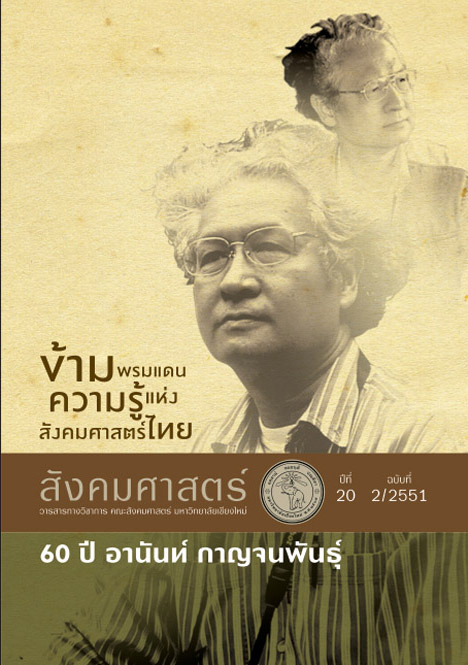Ritual and Belief Systems: Anan Ganjanapan’s Anthropological Political Economy
Main Article Content
Abstract
As is widely recognized, Anan Ganjanapan’s contribution to the development of Thai anthropology is extremely wide, ranging from agrarian development, differentiation of the peasantry, labour control, land ownership, community forestry, to the topics of belief systems, ritual practices, morality, gender, and witchcraft. No Thai anthropologist so far has attained such wide coverage of anthropological issues. In most of his works, the wide range of social and cultural phenomena is put together in a holistic perspective that is placed in complicated and dynamic relationships in the political economy of the peasant society. This chapter is an attempt to reveal this particular brand of ‘anthropological political economy’, focusing on his analyses of rituals and belief systems in Northern Thailand.
Article Details
All written articles published on Journal of Social Sciences is its author’s opinion which is not belonged to Faculty of Social Sciences, Chiang Mai University or is not in a responsibility of the journal’s editorial committee’s members.
References
--------.1984b ‘The idiom of phi ka’: peasant conception of class differentiation in Northern Thailand’, Mankind 14(4): 325–29. (Also see Anan 2527)
--------.2527 (1984) ‘ผีกะ: ความคิดในทางชนชั้นของชาวนาภาคเหนือ’, พัฒนาการของชีวิตและวัฒนธรรมล้านนา, เชียงใหม่:โครงการตำารามหาวิทยาลัย, หน้า113–26.
--------.1989 ‘Conflicts over the development and control of labor in a Northern Thai village’, in Gillian Hart, Andrew Turton, and Benjamin White (eds.) Agrarian Transformations: Local Processes and the Stage in Southeast Asia, Berkeley: University of California Press, pp.98–122.
--------. 2532 (1989) with Schalartchai Ramithanond ‘พิธีกรรมและความเชื่อล้านนาและการผลิตใหม่ของอำานาจทางศีลธรรม’, สมุดสังคมศาสตร์ 12: 123–139.
--------.1991 ‘Changing power and position of mo muang in Northern Thai healing rituals’, Paper presented at the symposium on Popular Knowledge and Spirit Cults in Southeast Asia, National Museum of Ethnology, Osaka, Japan. (Also see the Japanese version translated by Kumiko Kato, 1993)
--------.2534 (1991) ‘พิธีกรรมและความเชื่อในการรักษาพยาบาลพื้นบ้านภาคเหนือ’, ทวีทอง หงษ์วิวัฒน์, เพ็ญจันทร์ ประดับมุข และจริยา สุทธิสุคนธิ์ (บรรณาธิการ) พฤติกรรมสุขภาพ, กรุงเทพฯ: ศูนย์ประสานงานทางการแพทย์และสาธารณสุข กระทรวงสาธารณสุข.
--------.1992 ‘Northern Thai rituals and beliefs: the reproduction of morality’, in Proceedings of the First International Symposium to Present the Results of Projects Funded under the Toyota Foundation’s International Grant Program.
--------.2536 (1993) ‘ผีมด ผีเม็ง: ผีบรรพชนของคนมอญ’, The Earth 2000 1: 87–98.
--------.2542 (1999) ‘พิธีไหว้ผีเมืองและอำานาจรัฐในล้านนา’, สังคมและวัฒนธรรมในประเทศไทย, กรุงเทพฯ: ศูนย์มานุษยวิทยาสิรินธร (องค์การมหาชน), หน้า151–161.
--------.2000 Local Control of Land and Forest: Cultural Dimensions of Resource Management in Northern Thailand, Chiang Mai: Regional Center for social Science and Sustainable Development, Faculty of Social Sciences, Chiang Mai University.
Bloch, Maurice 1986 From Blessing to Violence: History and Ideology in the Circumcision Ritual of the Merina of Madagascar, Cambridge: Cambridge University Press.
Irvine, Walter 1984 ‘Decline of village spirit cults and growth of urban spirit mediumship: the persistence of spirit beliefs, the position of women and modernization’, Mankind 14(4): 325–34.
Marx, Karl 1983 (1884–86) ‘The German ideology, volume one’, in The Portable Karl Marx, edited by Eugene Kamenka, New York: Viking Penguin.
Morris, Rosalind 2000 In the Place of Origins: Modernity anhd Its Mediums in Northern Thailand, Durham and London: Duke University Press.
Ong, Aihwa 1987 Spirits of resistance and capitalist discipline: factory women in Malaysia, Albany: State University of New York Press.
Ortner, Sherry 1984 ‘Theory in anthropology since the sixties’, Comparative Studies in Society and History 26: 126–66.
--------.2001 ‘Specifying agency: the Comaroffs and their critics’, Interventions 3(1): 76–84.
Roseberry, William 1988 ‘Political economy’, Annual Review of Anthropology 17: 161–85.
Shalartchai Ramithanond 2527 (1984) Phi chao nai, Chiang Mai: Ming Mueang.
Tanabe, Shigeharu 1984 ‘Peasant rebellions in Siam at the turn of the twentieth century’, in Andrew Turton and Shigeharu Tanabe (eds.) History and Peasant Consciousness in South East Asia, Senri Ethnological Studies, No.13, Osaka: National Museum of Ethnology, pp.75–109.
--------.1991 ‘Spirits, power, and the discourse of female gender: phi meng cult of Northern Thailand’, in Manas Chitakasem and Andrew Turton (eds.) Thai Constructions of Knowledge, London: School of Oriental and African Studies, pp. 183–212.
--------.2002 ‘The person in transformation: body, mind and cultural appropriation’, in Shigeharu Tanabe and Charles F. Keys (eds.) Cultural Crisis and Social Memory: Modernity and Identity in Thailand and Laos, London: Routledge, pp.43–67.
--------.2008 ‘Introduction: imagined and imagining communities’, in Shigeharu Tanabe (ed.) Imagining Communities in Thailand: Ethnographic Approaches, Chiang Mai: Mekong Press, pp.1–19.
Turner, Victor 1967 The Forest of Symbols, Ithaca, N.Y.: Cornell University Press.
Turton, Andrew 1977 ‘Rituals of expulsion in Northern Thailand’, Seminar paper, Centre of South East Asian Studies, School of Oriental and African Studies.
--------.1984 ‘Limits of ideological domination and the formation of social consciousness’, in Andrew Turton and Shigeharu Tanabe (eds.) History and Peasant Consciousness in South East Asia, Senri Ethnological Studies, No.13, Osaka: National Museum of Ethnology, pp.19–73.


